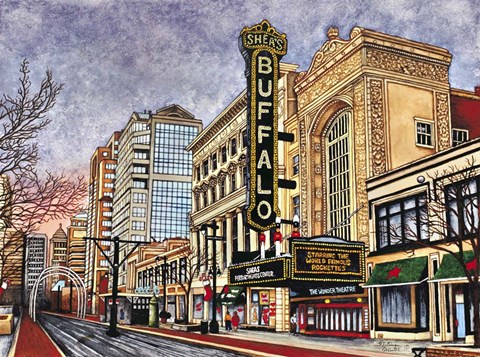Inspiration from Buffalo, NY
 |
| Fulcrum Gallery, accessed 9/15/2018 |
I have been studying as a student in the Master's of Urban Planning program at University at Buffalo for a year now. Before that, I worked at a non-profit organization called Downtown Colorado, Inc., which helped support smaller towns in Colorado handle economic development better. And before that, I earned a Master's in Public Administration from the University of Kentucky. After several years of reflection, observation, and thinking, I've come to some conclusions about how a local government system may be able to help distressed and under-developed areas of their jurisdiction. The following post is a quick discussion of some of these concepts:
To begin, micro-loans to businesses, landlords, and homeowners: an excellent tool for incrementally repairing old buildings, and building new ones at scale to revitalize neighborhoods. Forget tax breaks, put some money into the projects that are needed, raised from the surrounding community, and be repaid over time for low to no interest loans. That's called effective taxation, to make an economic use of the funds raised, and how the funds are spent. Far from Colbert's "plucking the goose such that it minimally hisses" philosophy on taxation, we could make economic cases to raise and spend taxes, so that there is mutual consent to how they are raised, and how they are spent locally. In other words: by raising money in this fashion, we can pay for these benefits that you can take full advantage of, in exchange for paying a portion of the costs of providing it. Citizens could participate in the process of determining how revenues are raised, and how they are spent in their area, such that they could shape the direction of development in their community, and be trained on how to operate the system to get the benefits from it.
A challenge of this, would be determining the geographic boundaries across economic, cultural, and social boundaries that do not necessarily match or align. Multi-layered social network analysis may be a helpful for accomplishing this. The rest of it, involves making public spending go towards fixing publicly used aspects, such as curbs and sidewalks. The City could also do stuff directly on the land that the City owns, and let the government have a part that acts as a developer that is accountable and responsible to the well-being of the people who live there. This means feedback mechanisms that the government entity is either legally bound to follow, and/or allowing for direct flows of information from people to government and government to people. In other words, let the government be its own society's developer, especially if they own a lot of the land in their jurisdiction.
I've also observed that governments often have to pre-chew costs for businesses to encourage development, like a momma-bird regurgitating pre-digested food it into the mouths of little chicks in order to get them to grow. The government can then work on socializing the people to promote pro-social business behavior, and the formation of pro-social and pro-environmental companies. That's the potential power and influence of socially determined regulation of the apparati that produce and maintain the economy. Just as regulation occurs in the mitochondria in the mammalian cell to keep it from going cancerous, so too must it exist in the larger human society. The laws scale, and they may be fractal across the different scales of our existence.
All of this is the current sum of the work I have done in Buffalo, NY. It's truly been a tremendous experience getting to know the City, and I hope to help it more in the future, network permitting. Here's hoping.
Comments
Post a Comment